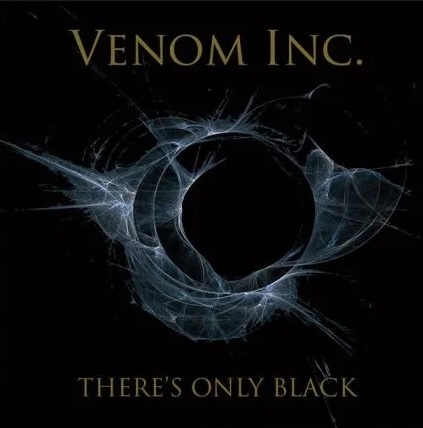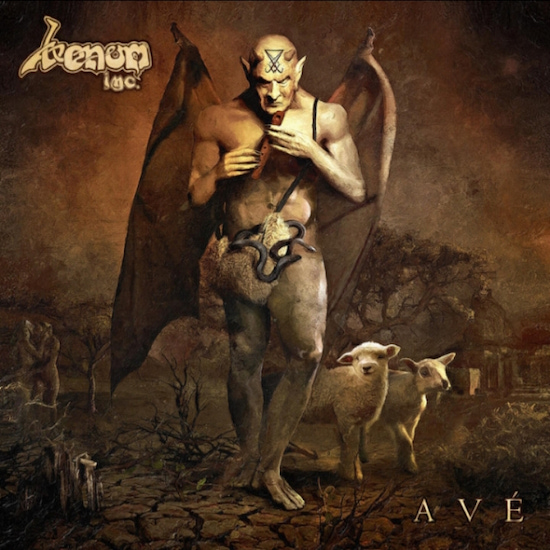Venom Inc. - Interview
Brazil has a special place in the hearts of Venom Inc., especially for vocalist and bassist Tony Dolan, who has a deep connection to the country. With a long history of memorable performances in several Brazilian cities, he considers Brazil to be a second home. The absence of guitarist Jeff "Mantas" Dunn due to a recent heart attack raises suspicions and concerns, but Tony assures that he and his colleagues are supportive and committed to supporting him during his recovery. Finally, Dolan discusses several aspects, including "There's Only Black" (2022), Venom Inc.'s latest album; the albums he recorded with Venom between 1989 and 1992, and "Future Warriors" (1985), Atomkraft's debut work, recently rereleased on CD in Brazil by Voice Music / Rock Brigade Records.
Marcelo Vieira

How is Mantas' health following the recent heart attack?
Physically, he is fine, but he is scared. Because of this, he doesn't feel mentally capable of committing to shows. The fear of dying during a trip haunts him. Therapy and emotional support are essential to help him overcome this anxiety. He needs to rest. In the meantime, his bandmates will continue to support him and wait for his full recovery.
How is the band coping with his absence?
When Jeff couldn't participate in a U.S. tour due to personal issues, I invited Mike Hickey, who had played with Venombefore. Later, in South America, since Mike wasn't available, I invited Marc Jackson to replace him. During this time, Jeff had his second heart attack, which was devastating. But I met Curran Murphy, the leader of the band 72 Legions, and thought he could fill in. He played with us in Jakarta and was amazing. The shows have been great, and we've decided to continue this way until Jeff is ready to return. Fans are receiving it well, and there's no pressure on Jeff. The shows with this new lineup have been incredible, and we're excited to continue.
What does Brazil mean to Venom Inc.?
Brazil has always held a special place in my heart since I was 14 years old. I've visited the country several times, playing in cities like Curitiba, Porto Alegre, Rio de Janeiro, and São Paulo. I feel a deep connection with Latin America, but Brazil is like a second home to me. I can't explain it, but when I'm there, it feels like I'm coming back home. The energy, the people, the food; everything makes me feel welcomed. Brazil is part of who I am, and that's something I value greatly.
The last visit of Venom Inc. to the country was canceled for reasons still unclear. What exactly happened?
There were several issues, including lack of information and delays in organization. It wasn't our decision to cancel, but rather a series of complications we faced.
The album "There's Only Black" seems to address more current and engaged themes compared to Venom's previous works. What motivated you to tackle topics like the pandemic, misinformation, and populism?
Since 'Parasite' on "Prime Evil," I've explored themes like government corruption and human duality, questioning the morality of our actions. I reflect on how, while performing altruistic acts, we also contribute to problems like the creation of nuclear weapons. This duality is recurrent in human history and wars, and it's always the people who suffer the consequences of political decisions, while the leaders remain distant and protected.
But overall, "There's Only Black" stems from a broader project about the journey of life and the insignificance of achievements and beliefs in the face of death. This reflection arose when Mantas sent me the title track. His lyrics described his near-death experience, in which he saw no lights or angels, only darkness. It made me question the nature of existence and what happens after death. Hence the decision to simplify the album cover, placing a black hole, a symbol of the unknown, inviting listeners to explore fundamental questions about life and death.
Between 1989 and 1992, you recorded three studio albums with Venom. Which one is your favorite?
"Prime Evil" was a crucial album for Venom, and I actively participated in composing about 60% of the songs. Working on this project was exciting for us, and the final result was amazing and meaningful to everyone. "Temples Of Ice" was disappointing in terms of cover art, in my opinion. I wasn't involved in its creation and didn't like the result. Despite the good tracks and energetic performances, the production didn't reach the same quality standard as "Prime Evil," which affected it negatively. "The Wastelands" had better production, but again the cover was disappointing, unrelated to the songs. Nevertheless, the album contained great tracks. Instead of choosing a favorite among them, I would combine the best songs from each to create an excellent album, if produced correctly.
That said, each Venom album is unique, reflecting constant evolution and a distinct approach. They value diversity, incorporating elements of black metal in production in different ways with each release. This is a distinctive feature of the band, preferring uniqueness over repetition.
The sequence "Avé" and "There's Only Black" exemplifies this well.
I agree. Two different and intense approaches to production, reflecting the diversity of themes. "There's Only Black"was rawer and faster [than "Avé"], capturing the urgency of the band live. The album seeks to convey the feeling that time flies, hoping that listeners will feel the desire to return after finishing listening.
Do you think the passage of time has given "Prime Evil," "Temples Of Ice" and "The Wastelands" the importance they deserve and the reverence they didn't have at the time?
"Prime Evil" is often cited as underrated, but its presence is evident everywhere I go. The album received positive reviews and had good sales at the time of its release, defying expectations after the departure of the original members. Now, especially with the emergence of Venom Inc., there is renewed interest in "Temples Of Ice" and "The Wastelands," which are being revisited and appreciated by a broader audience.
I'd like to talk about Atomkraft since the album "Future Warriors" was recently re-released on CD in Brazil.
The inspiration for Atomkraft came in 1978 when I watched Motörhead and The Dickies, my favorite punk band at the time. I saw Karlos Kaballero, drummer of The Dickies, playing at 220 beats per minute, something unprecedented. I imagined combining that speed with the sound of Motorhead, and thus Atomkraft was born. In 1985, we no longer had the original members, so I recruited two new musicians and recorded the album "Future World" for Neat. Although it didn't turn out exactly as initially planned, revisiting and playing that album live made me realize we captured the essence of Atomkraft.
The response to the re-release has been incredible. Initially, I wasn't very involved in the project, but now I see the album everywhere, people bringing it to shows, and even asking if we're going to play Atomkraft. It's funny because I've been working on a new Atomkraft album for about 20 years, always getting sidetracked by other projects. Recently, I returned to the original tapes and started rewriting the songs. Within two or three months, I'll start producing this new album, possibly as a precursor or a sequel to "Future Warriors," following the same classic Motörhead style with just three members.
In the 1980s, Atomkraft was often compared to Venom. Was there any rivalry between the bands?
When we started, we were just local bands. Success seemed distant. But when Venom released their first single ["In League With Satan / Live Like An Angel (Die Like A Devil)"] in 1981, it changed my perspective. It was inspiring to see familiar people achieving something big. When I needed new members for the band, the brother of Venom's manager, Eric Cook, suggested Ged [Wolf, drummer], who had just left Tysondog. We auditioned and got along well, so we moved forward together.
When we needed a new guitarist, we tested several, but none fit. Abaddon [Venom's drummer] suggested a 16-year-old he knew named Rob Mathew. I went to see him play and was impressed. He joined the band to record the album. Our first tour was with Slayer, followed by one with Exodus and Venom. Good times. There was no rivalry; we were good friends.
To wrap up, what do you think of the current heavy metal scene?
I particularly love breaking down barriers between musical genres. The reaction is explosive, showing that different genres can mix. I wish there weren't such rigid divisions between musical styles.
Currently, we have legendary bands like Metallica and Judas Priest still active, along with others like Deep Purple exploring new territories. There's also the phenomenon of Rammstein and the German thrash scene, besides metal coming from the United States and Nordic black metal. Latin America is also producing an incredible amount of progressive and innovative bands.
It's amazing to see the best musicians coming together, regardless of genres. They are truly talented, and it's an explosion of creativity. If I were 16 now, it would be the best time to get involved with music, as there is incredible diversity and quality in all styles. It's wonderful to be a part of this.
Upcoming Releases
- Morrath - Obscure Abominations - Feb 25
- Chalice - Divine Spear - Feb 27
- Blackwater Drowning - Obscure Sorrows - Feb 27
- Vide - Aux Enfants Des Ruines - Feb 27
- The Leaving - The Leaving - Mar 06
- Serpent Icon - Tombstone Stories - Mar 06
- Insect Inside - Reborn In Blight - Mar 06
- Triumpher - Piercing The Heart Of The World - Mar 06
- Lömsk - Act II - Of Iron And Blood - Mar 06
- God Against Humanity - The Judgement - Mar 06
- Miserere Luminis - Sidera - Mar 06
- Gravemass - This Is The Way - Mar 06
- No/Más - No Peace - Mar 13
- Monstrosity - Screams From Beneath The Surface - Mar 13
- Against I - Anti Life - Mar 13
- Empire Of Disease - While Everything Collapses - Mar 19
- Hanging Garden - Isle Of Bliss - Mar 20
- Putred - Blestemul Din Adânc - Mar 20
- Gaerea - Loss - Mar 20
- Diatribes - Degenerate - Mar 20


